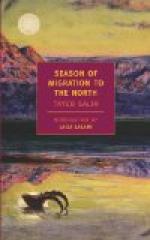“To-day William McGillivary and Katherine Stewart, daughter of Alexander Stewart, Chief Factor, were joined in holy wedlock by Captain John Franklin, R.N., Commander of the Land Arctic Expedition.”
Great is the force of example, for five days later appears the entry
“This evening the ceremonial of marriage took place between Robert McVicar, Esq., and Christy McBeath. Captain Franklin acted on the occasion as clergyman. The ceremony o’er, the evening was agreeably spent in a family assembly.”
Looking at these records, we are reminded of a not-very-well-known story of international courtesy which connects itself with the third and ill-fated journey of Franklin. Old Sir John, then in his sixtieth year, had sailed from England in an attempt at the Northwest Passage. Years passed and no word came from the explorer, and in 1852 the ice-desert was still mute.
In this year, Sir Edward Belcher in the Resolute headed one of the many Arctic Relief Expeditions, subsequently abandoning his boat in the ice off Melville Island. Next year the American whaler Henry George met the deserted Resolute in sound condition about forty miles from Cape Mercy; she must have drifted through Barrow Strait, Lancaster Sound, and Baffin Bay. She was recovered, the Government of the United States bought her and with international compliments presented her in perfect condition to Queen Victoria in 1856. The old ship was broken up about thirty years ago, and from the soundest of her timbers a solid desk was made by direction of Queen Victoria, who presented it to the then President of the United States. This is the desk which stands in President Taft’s reception room to-day, and on it the papers of eight administrations have been written.
There is living as well as buried history in Chipewyan. A stroll from one end of its lacustrine street to the other is lush with interest. We call upon Colin Fraser, whose father was piper to Sir George Simpson. Colin treats us to a skirl of the very pipes which announced the approach of Simpson whenever that little Northern autocrat, during his triumphal progress through a bailiwick as big as Europe, made his way into a new fort.
With the echo of the “Gay Gordons” in our ears we pass into the largest convent in the North country, managed by the Grey Nuns of Montreal. Sister Brunelle came into the North in 1866. Forty-two years in a convent-school of the Northland! It makes one gasp.
These Indian schools, assisted by the Canadian Government, catch the little Indians in the camps and hold their prey on school-benches from the age of four to fourteen. One boy is dumb, another a hunchback. In a corner we came upon a poor old derelict of the camps, a Cree woman, paralysed and mentally deranged, who within these quiet walls has found harbour. The kiddies are taught one clay in French and the next day in English; but when they hide behind their spellers to




